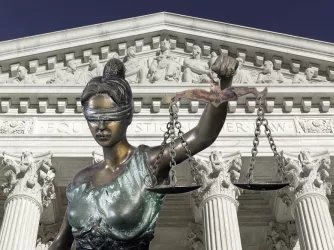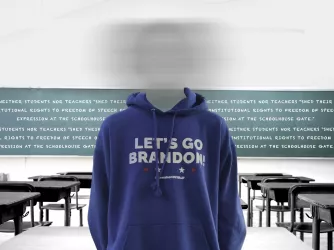Table of Contents
Liberal Science: The Benefits of Controversial Free Speech in the Wake of Donald Trump’s Campaign Message

FIRE has seen numerous cases in which students have attempted to combat speech they deem “offensive” by silencing it. However, a more effective tactic for countering controversial speech is to question its truthfulness through reasoned debate.
This method for fighting harmful speech was expounded by journalist Jonathan Rauch in his 1993 book Kindly Inquisitors: The New Attacks on Free Thought. Rauch makes a compelling argument for free speech and the role it plays in helping society determine truth from falsity. Rauch disputes the idea that certain speech—particularly what some deem “hate speech”—should be censored. For Rauch, “liberal science”—a process in which ideas, as well as proponents of those ideas, are subjected to public criticism through open forums—acts as a way to remedy hate speech.
Dialogue has been an essential foundation for democratic societies and free speech, and even when considered “offensive,” has helped progress diverse causes. For example, Rauch writes that hateful speech towards the LGBTQ community in the 1990s spurred activism by opening the door for discussions of gay rights, including the constitutionality of same-sex marriage.
Rauch’s liberal science is a particularly pivotal concept for college students, as college campuses often bring together students from myriad value systems. Campuses should be designed so that when these value systems come into conflict with one another on campus, a healthy debate will result that gives students a real chance to evaluate the validity of their beliefs. Shutting down the opportunity for debate, on the other hand, is likely to lead to the hegemony of one group’s speech over another, which is contrary to the heart of intellectual freedom.
Though Kindly Inquisitors was published more than two decades ago, its message remains pertinent. Recently, presidential candidate Donald Trump made remarks concerning undocumented immigrants from Mexico that many found offensive. During his campaign announcement, Trump stated:
When Mexico sends its people, they’re not sending their best. … They’re sending people that have lots of problems, and they’re bringing those problems with us. They’re bringing drugs. They’re bringing crime. They’re rapists. And some, I assume, are good people. … It’s coming from more than Mexico. It’s coming from all over South and Latin America.
Trump’s statement about Mexican immigrants has spurred activism across the country as the Latino community and its allies have led the charge to denounce his views. A recent petition on change.org called for NBC to cancel the Trump-owned Miss USA and Miss Universe pageants, as well as Trump’s reality show “The Apprentice.” The petition garnered more than 200,000 signatures and prompted NBCUniversal to terminate its business relationship with Trump as well as to not air the Miss USA and Miss Universe pageants on its network.
Other public figures have also been outspoken in their distaste for Trump’s comments. For example, Puerto Rican actress Roselyn Sanchez posted a photo on her Instagram account with a caption, translated from Spanish by the Latin Times, which read, “We are the force that keeps this country afloat. … Enough with racism … .” The picture has received over 1,300 comments. Singer Becky G addressed Trump’s remarks with a song entitled, “We Are Mexico,” a minute-long tribute to Mexican culture and work ethic. The song has already garnered nearly 900,000 views on YouTube.
Trump’s statement has also triggered important discussion regarding issues of immigration reform in the U.S. On a segment of The Kelly File, Fox News correspondents Ann Coulter and Geraldo Rivera debated the validity of Trump’s remarks. Rivera questioned the empirical basis of Trump’s claim, stating, “Undocumented immigrants commit crimes at a lower rate than the citizen population of the United States.” Coulter took issue with Rivera’s claim, stating, “Look at the Los Angeles County’s ‘Most Wanted List.’ Whether it’s the top 10 or the top 100, the idea that immigrants are committing crime at a lower rate than the native population is preposterous.”
It is clear that while Trump’s comments offended the Latino community and its allies, his freedom to voice those opinions has driven the national civil rights debate concerning Latino immigrants back to the forefront of American politics, proving that even contentious free speech can be beneficial and constructive. To young millennials across college campuses, this should serve as an example of the productiveness of “liberal science.” Don’t shy away from speech you find offensive. Instead, seize the opportunity to engage in dialogue and ignite activism on your campus.
Dashaya Foreman is a FIRE summer intern.
Recent Articles
FIRE’s award-winning Newsdesk covers the free speech news you need to stay informed.

Supreme Court must halt unprecedented TikTok ban to allow review, FIRE argues in new brief to high court

Australia blocks social media for teens while UK mulls blasphemy ban

Free speech advocates converge to support FIRE’s ‘Let's Go Brandon’ federal court appeal
